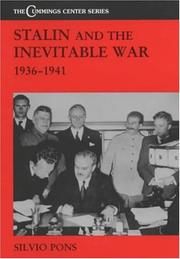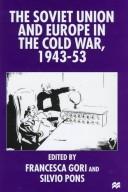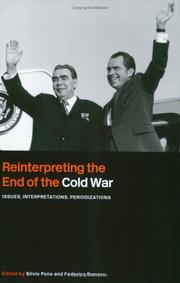| Listing 1 - 10 of 15 | << page >> |
Sort by
|

ISBN: 1136758178 0429236654 0415761336 0203821556 1136758186 9780203821558 0714651982 9780714651989 9781136758188 9781136758133 9781136758171 9780415861755 Year: 2002 Publisher: London Portland, Or. Frank Cass
Abstract | Keywords | Export | Availability | Bookmark
 Loading...
Loading...Choose an application
- Reference Manager
- EndNote
- RefWorks (Direct export to RefWorks)
This translation of the Silvio Pons study of how the Soviet Union responded to the European crises that led to World War Two focuses upon Soviet and communist policies during the main international crises that occurred from 1936 to 1939.
World War, 1939-1945 --- National socialism --- Diplomatic history. --- Causes. --- Historiography --- Soviet Union --- Foreign relations
Book
ISBN: 1316137023 Year: 2017 Publisher: Cambridge : Cambridge University Press,
Abstract | Keywords | Export | Availability | Bookmark
 Loading...
Loading...Choose an application
- Reference Manager
- EndNote
- RefWorks (Direct export to RefWorks)
The first volume of The Cambridge History of Communism deals with the tumultuous events from 1917 to the Second World War, such as the Russian Revolution and Civil War, the revolutionary turmoil in post-World War I Europe, and the Spanish Civil War. Leading experts analyse the ideological roots of communism, historical personalities such as Lenin, Stalin, and Trotsky and the development of the Communist movement on a world scale against this backdrop of conflict that defined the period. It addresses the making of Soviet institutions, economy, and society while also looking at mass violence and relations between the state, workers, and peasants. It introduces crucial communist experiences in Germany, China, and Central Asia. At the same time, it also explores international and transnational communist practices concerning key issues such as gender, subjectivity, generations, intellectuals, nationalism, and the cult of personality.
Book
ISBN: 9788833138664 8833138666 Year: 2022 Publisher: Roma Viella
Abstract | Keywords | Export | Availability | Bookmark
 Loading...
Loading...Choose an application
- Reference Manager
- EndNote
- RefWorks (Direct export to RefWorks)
Human rights --- Communism --- History --- History --- Gorbachev, Mikhail Sergeevich, --- Italy --- Soviet Union --- Politics and government --- Politics and government

ISBN: 0333653165 Year: 1996 Publisher: Basingstoke Macmillan
Abstract | Keywords | Export | Availability | Bookmark
 Loading...
Loading...Choose an application
- Reference Manager
- EndNote
- RefWorks (Direct export to RefWorks)
History of Eastern Europe --- History of Europe --- International groups --- anno 1940-1949 --- anno 1950-1959 --- Russian Federation --- Cold War --- Guerre froide --- Koude oorlog --- Oorlog [Koude ] --- Russia --- Europe --- Foreign relations --- Soviet Union

ISBN: 0714684929 071465695X 0714656003 Year: 2005 Volume: 6 Publisher: London Cass
Abstract | Keywords | Export | Availability | Bookmark
 Loading...
Loading...Choose an application
- Reference Manager
- EndNote
- RefWorks (Direct export to RefWorks)
The history of the Cold War is being re-written according to the newly available sources. But first and foremost it needs to be re-conceptualized and framed within the broader historical context that transformed the Cold War from the 1960s onwards, altered the very dynamics of bipolarism, and eventually brought it to its end. The long duration and the unexpectedly peaceful ending of the Cold War call for new views that transcend the established paradigms about its inception. Historians ought to address all those transformations in the international economy, in the networks of interdependence linking together new areas - especially in Asia - and in the ensuing cultural images that gradually narrowed the relevance of bipolarism. Thus the habitual diplomatic and security themes must be enjoined with economic, ideological, technological and cultural ones. Here a distinguished group of international history specialists discusses the complex relationship between Cold War dynamics, the globalizing of capitalism, and the demise of Soviet Communism. Their controversial and conflicting views, as well as their multidisciplinary approaches, highlight the various factors that constituted (and did not constitute) the Cold War. Thus they help to redefine the concept itself, to map its values and limitations, and to propel historical debate onto new grounds.
World history --- anno 1900-1999 --- Cold War --- Guerre froide --- Congresses --- Congrès --- Communist countries --- Pays socialistes --- History --- Congresses. --- Histoire --- World politics --- #A0505HI --- -Iron curtain lands --- Russian satellites --- Second world (Communist countries) --- Soviet bloc --- Former communist countries --- World politics#A0505HICommunist countries --- Former communist countriesHistory --- -History --- Congrès --- Iron curtain lands
Book
ISBN: 9780199657629 0199657629 Year: 2014 Publisher: Oxford : Oxford University Press,
Abstract | Keywords | Export | Availability | Bookmark
 Loading...
Loading...Choose an application
- Reference Manager
- EndNote
- RefWorks (Direct export to RefWorks)
Communism --- Communisme --- History --- Histoire --- Communist International --- Communism. --- Révolutions et socialisme --- History. --- Communism - History - 20th century --- Révolutions et socialisme
Book
ISBN: 0191015024 9780191015021 9781322061795 1322061793 9780199657629 0191054100 Year: 2014 Publisher: Oxford, England : Oxford University Press,
Abstract | Keywords | Export | Availability | Bookmark
 Loading...
Loading...Choose an application
- Reference Manager
- EndNote
- RefWorks (Direct export to RefWorks)
The Global Revolution. A History of International Communism 1917-1991 establishes a relationship between the history of communism and the main processes of globalization in the past century. Drawing on a wealth of archival sources, Silvio Pons analyses the multifaceted and contradictory relationship between the Soviet Union and the international communist movement, to show how communism played a major part in the formation of our modern world.The volume presents the argument that during the age of wars from 1914 to 1945, the establishment of the Soviet state in Russia and the birth of the comm
International relations. --- Coexistence --- Foreign affairs --- Foreign policy --- Foreign relations --- Global governance --- Interdependence of nations --- International affairs --- Peaceful coexistence --- World order --- National security --- Sovereignty --- World politics --- Communist International --- Communist Party of Ireland --- C.P.I. --- CPI --- Communist Information Bureau --- Kyōsan Intānashonaru --- Kyōsan Shugi Intānashonaru --- Bolshevik International --- International Communist Congress --- Red International --- Third Communist International --- Third International --- Tretiĭ Internat︠s︡ional --- International (Third) --- Kommunisticheskiĭ Internat︠s︡ional --- Kommunistische Internationale --- Internazionale comunista --- Коминтерн --- Komintern --- Comintern --- Troisième Internationale --- Dritte Internationale --- Komunistická internacionála --- Třetí Internacionála --- Internacional Comunista --- 3-ĭ Internat︠s︡ional --- Internationale communiste --- I.C. (Communist International) --- IC (Communist International) --- Kommunistiska internationalen --- Terza Internazionale --- Kominterun --- Комунистический интернационал --- Komunisticheskiĭ internat︠s︡ional --- Daisan Intānashonaru --- Konmintan --- Kung chʻan kuo chi --- Kokusai Kyōsantō --- Komintān --- Mosukō Intānashonaru --- Tretja Internacionala --- Komuminterun --- Kommunista Internacionálé --- Communistische Internationale --- Kūmintrun --- كومنترن --- אינטרנצינל הקומוניסטי --- コミンテルン --- 共產國際 --- Tercera Internacional --- History.
Book
Abstract | Keywords | Export | Availability | Bookmark
 Loading...
Loading...Choose an application
- Reference Manager
- EndNote
- RefWorks (Direct export to RefWorks)
Book
ISBN: 3031067975 3031067967 Year: 2023 Publisher: Cham, Switzerland : Palgrave Macmillan,
Abstract | Keywords | Export | Availability | Bookmark
 Loading...
Loading...Choose an application
- Reference Manager
- EndNote
- RefWorks (Direct export to RefWorks)
Offering a fresh take on a crucial phase of European history, this book explores the years between the 1980s and 1990s when the European Union took shape. Whilst contributing to existing literature on the Maastricht Treaty and European integration at the end of the twentieth century, the book also brings those debates into the twenty-first century and makes connections with longer-term issues. The transformation of the European political climate in the wake of the global financial crisis in 2008, and the watershed Brexit vote in 2016, has made it all the more urgent to reconsider the way scholars and opinion-makers have looked at European integration in the past. Drawing from recently released archival documents, the authors analyse European cooperation as part of the broader international history in which it unfolded, taking into account the changes in the Cold War order and the advance of a new phase of globalisation. Comparing and contrasting the debates, objectives and achievements of the 1980s and 1990s with the current political landscape of the European Union, this book proposes a novel interpretation of the choices that were made during the Maastricht years, and of their longer-term consequences.
Global Financial Crisis, 2008-2009. --- International economic integration. --- Europe --- Economic integration. --- Common markets --- Economic integration, International --- Economic union --- Integration, International economic --- Markets, Common --- Union, Economic --- International economic relations --- Global Economic Crisis, 2008-2009 --- Subprime Mortgage Crisis, 2008-2009 --- Financial crises --- European Union --- Treaty on European Union --- E.U. --- Fördrag om Europeiska unionen --- Maastricht-traktaten --- Maastricht Treaty --- Maastricht Treaty on European Union --- Maastrichtin sopimus --- Perjanjian Maastricht --- Sopimus Euroopan Unionista --- Synthēkē tou Maastricht --- TEU --- Traité de Maastricht --- Traktat o Unii Europejskiej --- Traktat on den Europæiske Union --- Tratado da União Europeia --- Tratado de la Union Europea --- Tratado de Maastricht --- Trattato di Maastricht sull'Unione Europea --- Treaty of Maastricht --- Verdrag betreffende de Europese Unie --- Vertrag über die Europäische Union --- Vertrag von Maastricht --- Economic History --- Business & Economics
Multi
ISBN: 9783031067976 9783031067969 9783031067983 9783031067990 Year: 2023 Publisher: Cham Springer International Publishing, Imprint: Palgrave Macmillan
Abstract | Keywords | Export | Availability | Bookmark
 Loading...
Loading...Choose an application
- Reference Manager
- EndNote
- RefWorks (Direct export to RefWorks)
Offering a fresh take on a crucial phase of European history, this book explores the years between the 1980s and 1990s when the European Union took shape. Whilst contributing to existing literature on the Maastricht Treaty and European integration at the end of the twentieth century, the book also brings those debates into the twenty-first century and makes connections with longer-term issues. The transformation of the European political climate in the wake of the global financial crisis in 2008, and the watershed Brexit vote in 2016, has made it all the more urgent to reconsider the way scholars and opinion-makers have looked at European integration in the past. Drawing from recently released archival documents, the authors analyse European cooperation as part of the broader international history in which it unfolded, taking into account the changes in the Cold War order and the advance of a new phase of globalisation. Comparing and contrasting the debates, objectives and achievements of the 1980s and 1990s with the current political landscape of the European Union, this book proposes a novel interpretation of the choices that were made during the Maastricht years, and of their longer-term consequences. Michele Di Donato is Assistant Professor of Contemporary History at the University of Pisa in Italy. His research focuses on the international history of the European Left, the Cold War and late 20th Century globalisation Silvio Pons is Professor of Contemporary History at the Scuola Normale Superiore of Pisa in Italy. He is the president of the Gramsci Foundation in Rome and a member of the Editorial Board of the Journal of Cold War Studies.
Politics --- World history --- History --- History of Europe --- geschiedenis --- politiek --- wereldpolitiek --- economische geschiedenis --- Europese geschiedenis --- anno 1500-1799 --- anno 1800-1999 --- Europe
| Listing 1 - 10 of 15 | << page >> |
Sort by
|

 Search
Search Feedback
Feedback About UniCat
About UniCat  Help
Help News
News